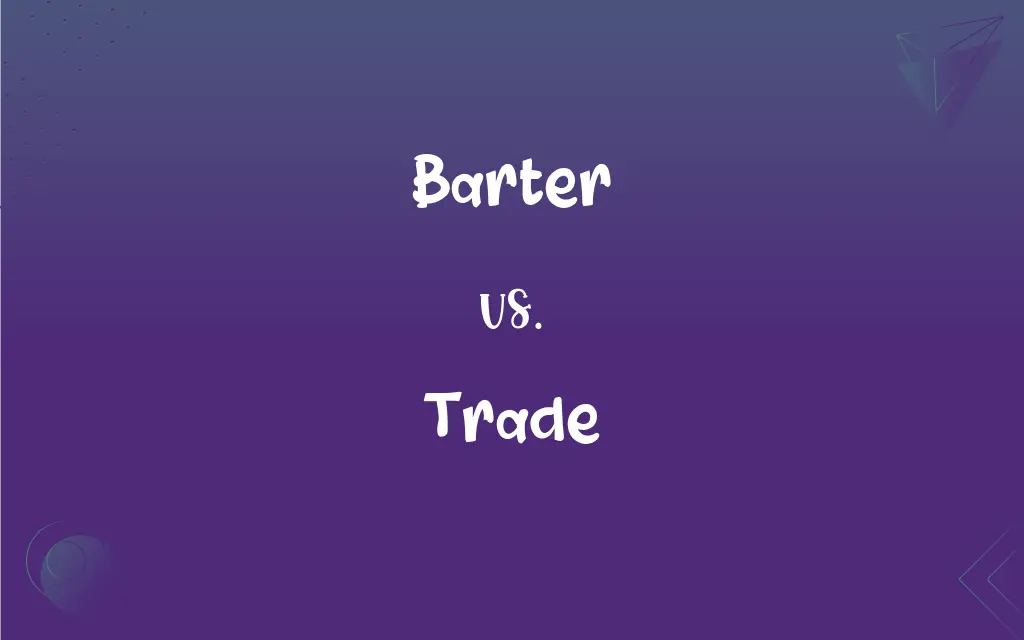Barter vs. Trade: What's the Difference?
Edited by Aimie Carlson || By Janet White || Published on January 12, 2024
Barter is the exchange of goods or services without using money, while trade generally involves the exchange of goods or services for money.

Key Differences
Barter is the direct exchange of goods or services without involving money. Trade, in a broader sense, usually involves the exchange of goods or services for money, acting as a medium of exchange.
Bartering is one of the oldest forms of economic transactions, used before the invention of money. Modern trade, however, has evolved to include complex transactions involving currency, digital payments, and credit.
In bartering, the value of goods or services is subjectively negotiated between the parties. In trade, market forces and currency values often determine the price of goods and services.
Barter typically occurs on a smaller scale between individuals or local communities. Trade encompasses local, national, and international levels, involving a wide range of goods, services, and financial instruments.
Bartering is simple and straightforward but can be limiting due to the need for a mutual desire for each other's goods or services. Trade, facilitated by money, allows for more complex and diverse economic interactions.
ADVERTISEMENT
Comparison Chart
Medium
Direct exchange of goods/services
Involves money as a medium
History
Ancient, pre-money economic system
Evolved with the invention of money
Value Determination
Subjective, negotiated between parties
Market-driven, often involves pricing
Scale
Often small-scale and local
Can be local to international
Complexity
Simple but limited in scope
More complex, diverse economic transactions
ADVERTISEMENT
Barter and Trade Definitions
Barter
Requires a mutual need for the offered goods/services.
The farmers bartered grain for livestock.
Trade
Encompasses local to global transactions.
Local trade markets contribute significantly to the economy.
Barter
Simple, often personal exchange.
Neighbors often barter tools and help among themselves.
Trade
Influenced by market prices and demand.
Trade prices for electronics fluctuate based on demand.
Barter
Involves a direct swap of items or services.
I bartered my painting skills for a room renovation.
Trade
The buying and selling of goods and services, typically for money.
International trade involves the exchange of goods between countries.
Barter
Exchange of goods or services without money.
They bartered fresh produce for carpentry work.
Trade
Can involve various economic activities.
Trade in the stock market is a form of financial trading.
Barter
An ancient form of trading.
Bartering was common in traditional societies before currency.
Trade
Facilitates a more complex economy.
Online platforms have revolutionized how trade is conducted.
Barter
To trade goods or services without the exchange of money.
Trade
The business of buying and selling commodities, products, or services; commerce.
Barter
To trade (goods or services) without the exchange of money.
FAQs
What is barter?
Barter is the direct exchange of goods or services without using money.
What is trade?
Trade is the buying and selling of goods or services, often involving money.
Can barter involve cash transactions?
No, barter strictly involves exchanging goods or services without cash.
Is trade always international?
No, trade can be local, national, or international.
What are the limitations of barter?
It requires finding someone with mutual needs for the specific goods or services.
Why has trade evolved from barter?
Due to the limitations of barter and the efficiency of using money as a medium.
How is value determined in barter?
Through negotiation and mutual agreement between the parties involved.
What role does currency play in trade?
It acts as a standard medium of exchange and value.
How does trade benefit the economy?
It facilitates larger-scale economic activities and the movement of goods and services.
Can barter be used in modern economies?
Yes, though it's more common in local or community-based settings.
Can anyone participate in trade?
Yes, individuals and entities can participate in various forms of trade.
How does globalization affect trade?
It expands trade opportunities and connects global markets.
Can services be bartered?
Yes, services can be exchanged just like physical goods in a barter system.
Is modern trade only about physical goods?
No, it includes services, digital products, and financial instruments.
Are taxes applicable in barter transactions?
Yes, the value of bartered goods/services can be taxable.
Is barter considered less efficient than trade?
Generally, because it requires a direct need-match between parties.
What skills are needed for successful bartering?
Negotiation and an understanding of the value of goods/services being exchanged.
Does trade require a physical marketplace?
Not necessarily, as online platforms now facilitate trade.
Can businesses engage in barter?
Yes, businesses can barter goods or services, though it's less common.
How do online platforms impact trade?
They increase accessibility and convenience for trading goods and services.
About Author
Written by
Janet WhiteJanet White has been an esteemed writer and blogger for Difference Wiki. Holding a Master's degree in Science and Medical Journalism from the prestigious Boston University, she has consistently demonstrated her expertise and passion for her field. When she's not immersed in her work, Janet relishes her time exercising, delving into a good book, and cherishing moments with friends and family.
Edited by
Aimie CarlsonAimie Carlson, holding a master's degree in English literature, is a fervent English language enthusiast. She lends her writing talents to Difference Wiki, a prominent website that specializes in comparisons, offering readers insightful analyses that both captivate and inform.

































































